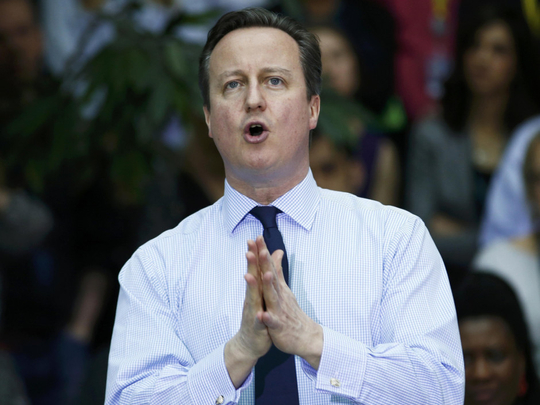
In times of conflict, British Prime Minister David Cameron likes to show his senior military officers who’s the boss. Remember that famous put-down during the Libyan campaign in 2011, “You do the fighting, and I’ll do the talking”? The rebuke was in response to the strong resistance he encountered from senior military officers such as General Sir David Richards, then head of the Armed Forces, who had raised concerns about the long-term security implications of overthrowing Colonel Muammar Gaddafi.
The prime minister’s reproach may have succeeded in asserting the primacy of his political leadership, but you only have to look at the lawless, terrorist-infested mess Libya has become to see who made the better judgement call. Now, to judge by the furious reaction to the publication in the Daily Telegraph of a letter signed by 12 senior military officers supporting Britain’s continued membership of the European Union (EU), No 10 has made another grave miscalculation. While Downing Street officials boasted that they had managed to sign up 13 of the country’s “most senior military leaders” to back the “in” campaign, their claim did not survive long before General Sir Michael Rose, a former SAS officer who commanded British forces in Bosnia, demanded to have his name removed. By so doing he joined many other former colleagues of high rank who have declined Cameron’s invitation to support the government’s highly dubious claim that the EU is an “important pillar of [Britain’s] security”.
Among the notable signatures missing from the document was that of Lord Richards of Herstmonceux, the title by which Britain’s distinguished former general is now known. Perhaps once the remaining signatories have examined the deeply flawed arguments Downing Street has advanced on their behalf to justify continued EU membership, they may also regret having signed up. Two particularly risible claims made in the letter, written by the special adviser Daniel Korski, are that EU diplomacy has had a positive impact on the recent global crises involving Iran’s nuclear programme and that it has done much regarding Russia’s military aggression towards Ukraine. Neither bears close scrutiny.
EU support for international sanctions against Tehran may, it is true, have persuaded the ayatollahs to abandon their confrontational stance towards the West in favour of a negotiated settlement. But the resulting deal, in which western negotiators — many from EU countries — capitulated on a number of key Iranian demands, can hardly be hailed as a success. On the contrary, the deal’s abject failure to reassure Iran’s Arab neighbours that Tehran no longer intends to acquire nuclear weapons has prompted one of the most worrying escalations in Middle Eastern tensions of recent times. Downing Street’s suggestion that the EU has helped to calm the situation in Ukraine is even more laughable.
It was the flawed diplomacy of Baroness Ashton, the EU’s hapless former foreign affairs spokesman (for whom Korski worked as a special advisor), that helped to stoke the flames of the conflict in the first place. Lady Ashton’s insistence on encouraging Ukraine to forge a closer relationship with the EU put Brussels on a dangerous collision course with Moscow, which has long-regarded Ukraine as being part of Russia’s “near abroad” — those countries that should come under Moscow’s sphere of influence.
The result of Lady Ashton’s cack-handed enterprise is that the former Ukrainian province of Crimea has been subjected to a de facto annexation by Russian troops, while Russian-backed militias have laid waste to large tracts of eastern Ukraine. If that’s the way the EU goes about improving European security, then any rational British voter is going to conclude that the most sensible course of action is to leave at the earliest possible opportunity.
Downing Street’s attempts to play politics with the reputations of some of our most distinguished military leaders are ill-judged, not least because of the weakness of the arguments. There is also a risk that some more serious implications will be overlooked, such as what fate might befall the whole European experiment if there is a vote in favour of Brexit. This is certainly the subject that concerns Field Marshal Lord Bramall. As a veteran of the D-Day landings, Lord Bramall knows a thing or two about what can happen to Europe when the normal laws of government do not apply.
“If Britain leaves the EU and the EU unravels as a consequence, then it could make Europe a far more dangerous place,” he explained, with all the implications that would have for Britain’s own security. Surely, this is the kind of serious issue we should be discussing during the referendum campaign rather than spurious claims concerning the triumphs of EU diplomacy?
— The Telegraph Group Limited, London, 2016
Con Coughlin is a British journalist and author, currently the Daily Telegraph Defence Editor.









